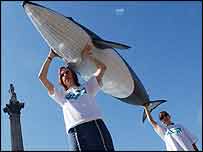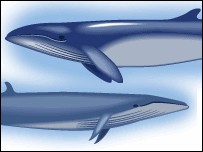|
Protest over Iceland's whaling plans
BBC NEWS
15th August 2003
Protesters in London's Trafalgar Square
with an imitation whale
Animal rights campaigners have protested in London against Iceland's decision to resume whaling.
The government of Iceland announced last week it would take 38 minke whales as part of a scientific programme and claimed the animals had become abundant since a moratorium on whaling came into effect in 1986.
Enraged wildlife supporters demonstrated in Trafalgar Square on Friday with a model of a baby minke whale.
Environmental campaigners at Greenpeace are sending their ship, Rainbow Warrior, to Iceland to highlight their concern.
Tony Banks, Labour MP, joined the protesters and branded Iceland's argument "ridiculous".
He said: "This is commercial whaling, they are perverting the name of science to slaughter animals.
"The ships are leaving harbour as we speak but we have to register a protest."
Animal welfare charity the RSPCA said British shoppers should consider boycotting Icelandic fish in protest at the country's decision to resume whaling.
It said there was no justification for Iceland's plans to kill 38 minke whales, for the first stage of a study to see whether they were responsible for falling fish stocks.
'Agonising deaths'
The animal charity and the International Fund for Animal Welfare (IFAW) said the study would lead to the deaths of 500 animals over the next two years.
At the London protest, spokesman Robbie Marsland said: "It takes one-and-a-half hours to kill a whale - there is no humane way to do it."
But Iceland's whaling commissioner, Stefan Asmundsson, told BBC News Online last week that with 43,000 minkes currently in its waters, the "scientific catch" would have no impact on the species' status.
Iceland also claims its harpoons killed whales instantly without suffering.
The RSPCA said Friday's resumption of hunting would affect waters including those north of Scotland, and would involve the use of "exploding grenade harpoons responsible for the agonising deaths of whales".
BBC News Online's guide to the
key species in the whale-hunting debate
RSPCA marine scientific officer Laila Sadler said: "We are convinced that whales are not responsible for a decline in fish numbers, but what we do know is that whales will suffer."
Gerd Leipold, executive director of Greenpeace International, said: "No science justifies the killing of whales. This is simply an underhand attempt by the Icelandic Government to resume commercial whaling."
Campaigners at IFAW said they were appealing to Iceland for a last-minute move to end what they call a "cruel and senseless" decision.
Spokeswoman Della Green, said: "There is no need to kill whales to find out what they eat... fish populations began to decline only after the introduction of intensive commercial fishing."
Fish stocks
Iceland's whaling commissioner Stefan Asmundsson said: "It's obvious to anyone that whales are very big animals and they eat a lot - a lot of fish.
"Precisely the effect they are having on fish stocks around Iceland, we don't know. We need better data."
Now Icelandic tourism bosses have stepped into the debate, warning the hunt might damage business.
The minke whales will be the first to be killed by Iceland since it suspended hunting in 1989.
Earlier this year, it said it wanted to take 100 minke, 100 sei and 50 fin whales for its study - but then scaled back its plans.
It said the high dependence of Iceland's economy on fishing meant it had to have a better understanding of all the factors that might impact fish stocks - including whales.
Top
|

